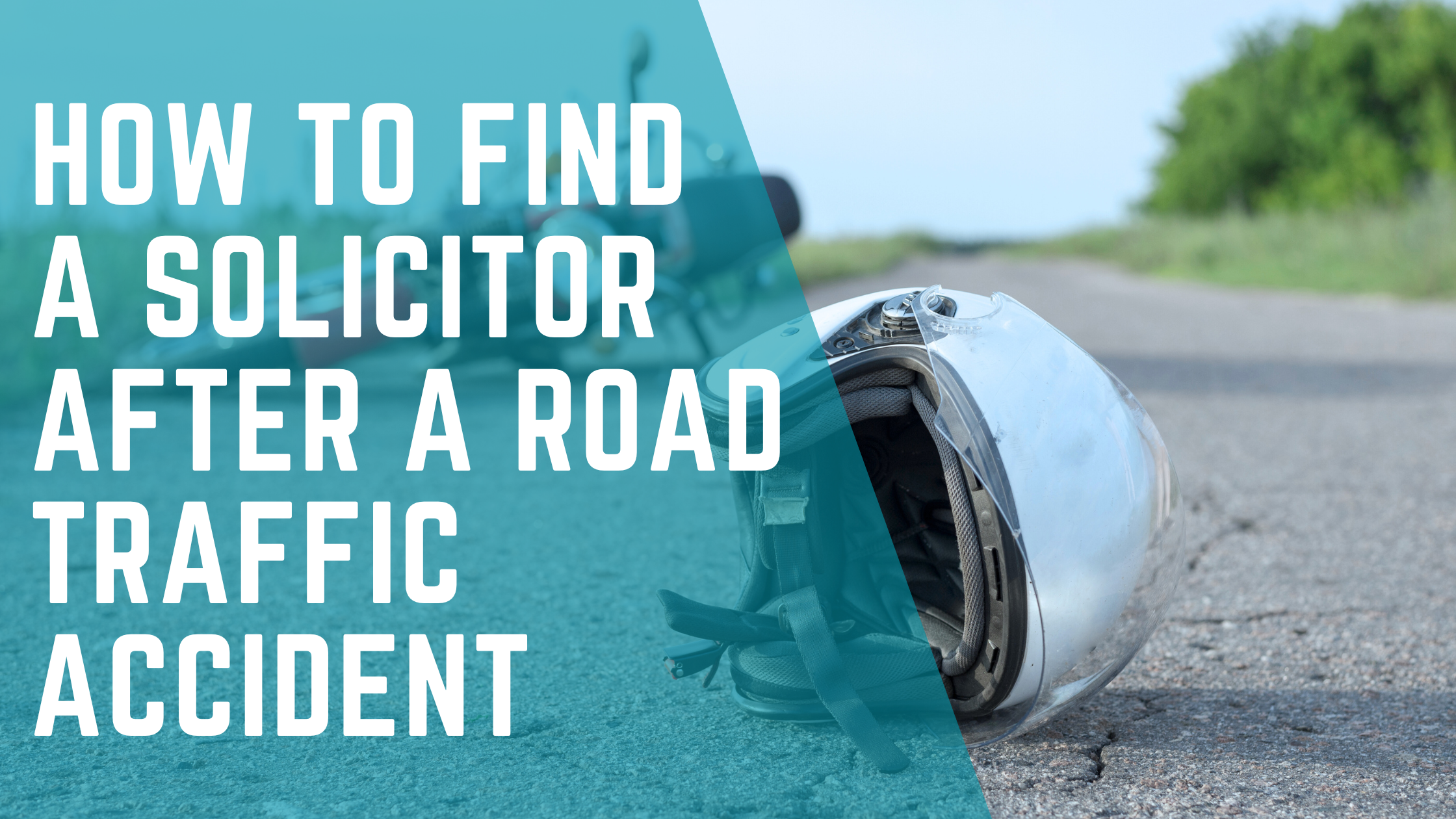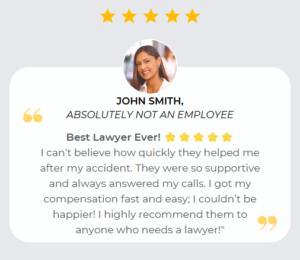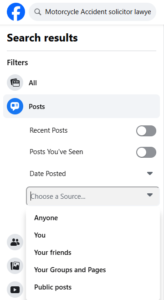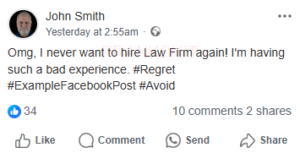How to Find a Solicitor or Firm

If you’ve been in a road traffic accident (RTA), finding the right solicitor can help you get the legal support you need. Whether you claim compensation, recover financial losses, or handle disputes, a solicitor will guide you through the process and protect your rights. Here’s an easy guide to help you find the right solicitor.
Step 1: Know What Kind of Solicitor You Need
You’ll want a solicitor who specialises in cases like yours. For road traffic accidents, look for someone with experience in:
- Personal Injury Law: These solicitors focus on helping people who have been injured.
- Road Traffic Accidents: Some solicitors specialise in RTA cases for drivers, motorcyclists, cyclists, or pedestrians.
Take Your Time Choosing the Right Solicitor
As bikers, we often rely on word of mouth when making decisions, especially after a road traffic accident. While recommendations from friends or fellow riders can be helpful, it’s important to remember that everyone’s needs differ. What worked well for one person may not be the right fit for you.
You shouldn’t feel pressured to choose a solicitor quickly. There’s no rush, and it’s entirely reasonable to take two weeks or even longer to think about who you want to instruct. This is an important decision; waiting a little can give you the space to clear your head and approach the choice with a calmer, more logical mindset.
It’s also worth remembering that most legal claims, especially personal injury cases, can take years to resolve. Taking an extra couple of weeks to consider your options carefully won’t impact the timeline of your claim. Still, it could make a massive difference in how comfortable and confident you feel with your solicitor.
Remember, this is about finding someone who understands your needs, communicates well, and can guide you through what might be a long and challenging journey. Take your time—you deserve to make the right choice.
Step 2: How to find a Solicitor or a Law Firm
After an accident, it’s normal to feel overwhelmed by the idea of finding a solicitor. You might be unsure of where to start or who to trust, as so many options are available. Feeling stressed or confused about the legal process while dealing with your recovery is common. You first want to grab a pen and a notepad (or use your phone) and start making a list of potential firms you find. Below is a step-by-step guide for finding solicitors to add to your list.
It’s recommended to consider a few solicitors or firms simultaneously so that you make an informed decision before agreeing to a contract!
Search online
Start your search online with these trusted resources. These websites let you search for solicitors by location and expertise.
Other tips and tricks to find firms
Step 3: Factors to consider in a Solicitor
Every solicitor is different, and it’s important to find one who suits your specific needs. Some factors to consider include their experience with cases similar to yours, their reputation, and whether they offer a no-win, no-fee arrangement. You should also consider how comfortable you feel with them. By considering what’s most important for your situation, you can choose a solicitor who will represent you well and help you through the process.
| Factor | Why It Matters | What to Look For |
|---|---|---|
| Experience and Specialisation | Ensures the solicitor has expertise in cases like yours. |
|
| Reputation | A strong track record means reliable service. |
|
| Communication | Clear communication keeps you informed and confident. |
|
| Fees and Payment Options | Understanding costs upfront avoids surprises. |
|
| Accreditation and Memberships | Indicates professionalism and high standards. |
|
| Location | Nearby solicitors allow for easier face-to-face meetings if needed. |
|
| Free Initial Consultation | Helps you decide if the solicitor is a good fit. |
|
| Personal Connection | Feeling comfortable with your solicitor makes the process easier. |
|
Step 4: Check for “No Win, No Fee” Options
Once you’ve narrowed your choices down to a few solicitors, it’s important to carefully consider the kind of contract you’ll have with them or their firm. The contract should clearly explain the terms of your agreement, including how they will charge for their services, whether it’s a fixed fee, hourly rate, or a no-win, no-fee arrangement.
Ask about any additional costs, such as court fees or administrative charges. It’s also good to discuss how the solicitor will communicate with you throughout the process and what you can expect regarding timeframes and updates. Reviewing and understanding the contract will help ensure that there are no surprises later on and that you’re comfortable with the agreement.
What is a No-win, No-fee?
A No Win, No Fee agreement means you don’t have to pay any legal fees if your case isn’t successful. In other words, if you lose your case, you won’t owe the solicitor anything for their time and work. However, if you win the case, the solicitor will charge a fee for their services. This fee is usually taken from the compensation you receive.
This fee is meant to cover the risk the solicitor took by agreeing to work on your case without upfront payment. The success fee percentage can vary depending on the solicitor or the firm. Some firms may charge a higher success fee, while others may charge less. Generally, the success fee can range from 10% to 25% of the compensation you win, though this can differ.
It’s important to understand that not all solicitors charge the same success fee, and the amount can depend on factors like the type of case, the solicitor’s experience, and how complicated your case is. Always ask your solicitor about their success fee before you agree to work with them so you know exactly what to expect.
BE WARY: Even on a no-win, no-fee basis, you could still be liable for vehicle hire costs if your claim is unsuccessful. Make sure you ask your solicitor about the potential financial risks of accepting a hire vehicle.
Compare Costs between firms.
Solicitors charge in different ways. Some have fixed fees, others charge hourly or take a percentage of your compensation. Ensure you understand their fees before agreeing to work with them and get everything in writing.
Consider whether you should book an initial free meeting before hiring a firm
Most solicitors offer free first consultations. Use this meeting to:
- Explain your situation and ask how they can help.
- Make sure they have experience with similar cases.
- See if you feel comfortable working with them.
These meetings are really helpful in understanding what each firm will offer you if you were to hire them to represent you.
Step 5: Questions to Ask a Solicitor Before Deciding
Don’t know what to ask a potential solicitor? That’s okay! Choosing a solicitor can be a difficult and overwhelming process, especially if you’ve never had to do it before. It’s natural to feel unsure whether they’re the right fit for your needs, as this is an important decision that can impact the outcome of your case.
I’ve created a table of key questions you can ask potential solicitors to simplify this process. These questions are designed to help you understand their experience, approach, and how they will support you so that you can feel more confident in your choice.
| Category | Questions to Ask |
|---|---|
| Experience and Expertise |
|
| Costs and Fees |
|
| Communication and Support |
|
| Timeframes |
|
| Success Rate |
|
| Process and Next Steps |
|
| Client Care |
|
| Legal Costs Insurance |
|
| What Sets Them Apart |
|
What if my Insurance company want to appoint a solicitor for me?
It’s important to know that while your insurance company may suggest a solicitor or even appoint one on your behalf, you have the legal right to choose who represents you. You don’t have to accept their chosen solicitor; you can opt to instruct an independent solicitor with whom you feel more comfortable.
If you plan to choose your solicitor but haven’t yet decided, it’s a good idea to communicate this with your insurance company. Let them know that you intend to take some time, such as two weeks, to carefully decide on the right solicitor for your case.
Once you’ve chosen your solicitor, they will usually contact your insurance company directly on your behalf, so you won’t need to handle this part yourself. It’s completely reasonable to take your time to make an informed decision that’s best for your needs.
Is it better to use my insurance company’s solicitor or appoint one of my own?
Ultimately, the decision comes down to what feels right for you. Consider whether you trust your insurance company to act in your best interests or feel a solicitor would better represent your needs.
Many bikers choose to select a solicitor who specialises in motorcycle accidents because they feel these solicitors understand their unique position and challenges more deeply. Given their experience with cases like theirs, many bikers feel that a specialist solicitor is more likely to fight for a better outcome on their behalf.
Whatever you decide, it’s important to feel confident that your solicitor will prioritise your needs and work in your best interests and that you are confident in your decision.
Check your Insurance Contract for Information about Legal Cover
It’s also worth checking with your insurance company whether you would be required to pay a success fee if you accept their appointed solicitor. A success fee is typically a percentage of the compensation you receive, and it can vary depending on the solicitor you choose.
Once you know this, you can compare it with the success fee that would apply if you appoint your solicitor. Some insurance policies cover all legal costs, but this is usually subject to certain conditions, so clarifying these details with your insurer is important.
By doing this, you can make an informed decision considering your choice’s financial and legal implications.
What if this is all too much for me to deal with?
If you’re happy with your chosen solicitor and don’t want to consider others, that’s completely fine. While it’s a good idea to compare a few firms, it’s not necessary. After an accident, things can be overwhelming, but ultimately, the most important thing is that you feel comfortable with the solicitor representing you and understand your agreement.
If unsure, you could ask a trusted friend or family member to help with the research. Having someone else to help can make the decision easier and less stressful. They can help you choose the right solicitor or offer reassurance during a tough time.
What if I change my mind about the solicitor or firm I hired?
If you hire a solicitor but later decide to change, you’re not locked into one solicitor for the entirety of your claim. You can transfer your claim if you later decide the firm you picked perhaps isn’t the right fit for you. Repeat the steps above to find a new solicitor and let them know you want to transfer your claim. Your new solicitor will be able to handle the process of transferring your case, making sure all the necessary paperwork and details are passed on smoothly. Just communicate your decision to your old and new solicitor, and they’ll guide you through the process.
Step 6: Protect yourself from fraud and compensation theft by checking that your solicitor is genuine.
Unfortunately, scammers sometimes pose as solicitors to trick people into giving them money. Here’s how you can protect yourself and spot a scam solicitor:
Check their Credentials
Checking the credentials below helps protect you from identity fraud, which can sometimes be risky when hiring a solicitor who isn’t part of an established law firm. Without the backing of a recognised firm, it’s even more crucial to verify the solicitor’s identity and ensure they’re registered with the SRA. This step gives you peace of mind, knowing you’re working with a legitimate, qualified professional. Always research to avoid potential risks and choose someone you can trust.
What credentials should I be looking for:
- The Law Society: They list qualified solicitors in specific areas of law. Check your solicitor’s area of expertise.
- The Association of Personal Injury Lawyers (APIL): Are they members of APIL? Members are experts in personal injury cases. Solicitors’ Regulatory Authority (SRA): The Solicitors’ Regulatory Authority (SRA) is the UK regulatory body that oversees solicitors and law firms to ensure they meet professional standards and act in clients’ best interests. This organisation will help check the identity of the person wanting to represent you.
Other steps to take
- Be Cautious of Slick Websites: Just because a law firm’s website looks professional doesn’t mean it’s real. Scammers often create fake websites to appear legitimate. Always verify using the “Find a Solicitor” tool.
- Verify Identity Checks: A legitimate solicitor will meet you in person to check your identity as part of anti-money laundering procedures. If they skip this step, be suspicious.
- Avoid Pressure to Pay Money to Your Solicitor: Real solicitors will never pressure you for payment and will provide an itemised bill upon request. Most Personal injury cases will work on a no-win, no-fee basis. If a solicitor asks for an upfront payment, this may be a sign that you should check who they say they are.
- Look for Poorly Written Communications: Scam e-mails and letters often contain spelling mistakes, poor grammar, or unprofessional language. If you spot these errors, it may be a sign of a scam.
Scams involving bigger law firms
Some scammers use phishing techniques or create websites with names similar to well-known, reputable law firms to trick you into thinking you’re dealing with a real company. They may pose as representatives of a trusted firm, hoping you won’t double-check.
However, a legitimate law firm will have no problem with you calling them independently to confirm your details. A reputable firm will confirm your information and reassure you that everything is legitimate. Always take this extra step to ensure you’re not being scammed. If you’re unsure, you can call the firm’s official phone number (found on their verified website) and ask:
“Hi, I’ve been in contact with [firm’s name] about my case, and I just want to confirm that I’m speaking to the correct firm. Can you verify my details before I e-mail my documents across”?”
Checking E-mail and Correspondence
It’s also crucial to double-check the e-mail address from which you receive communications. Scammers often use e-mail addresses that look very similar to legitimate ones but with small, easily overlooked changes. Always verify the e-mail address, especially if it’s asking for personal information or money. Legitimate law firms will use official e-mail addresses that match their domain name, while scam e-mails often come from suspicious, misspelt, or generic addresses.
Look at the table below and see if you can tell the difference between a real and a fake e-mail address.

Still feel worried?
Contact the SRA to confirm if you are ever in doubt about your solicitor’s identity and qualifications. You can do this by checking the Solicitors Register or Directly Contacting the SRA. Also, consider visiting the SRA’s website to learn more about reporting fraudulent and Bogus Solicitors.
Resources
- The Law Society – www.lawsociety.org.uk
- A trusted source for finding qualified solicitors and legal professionals in England and Wales.
- The Association of Personal Injury Lawyers (APIL) – www.apil.org.uk
- A network of personal injury lawyers that can help you find expert legal representation for accident claims.
- SRA – Solicitors Regulation Authority – www.sra.org.uk
- Verify a solicitor’s credentials and check if they are properly regulated.
- Citizens Advice Bureau – www.citizensadvice.org.uk
- Offers free, confidential advice on legal, financial, and other issues, including guidance on selecting a solicitor.
Disclaimer:
This website is not intended to replace professional services or provide legal advice. It is designed to offer general information and guide you in the right direction, helping you understand key topics related to motorcycle accidents. Please consult a qualified professional for specific legal, medical, or financial advice.


